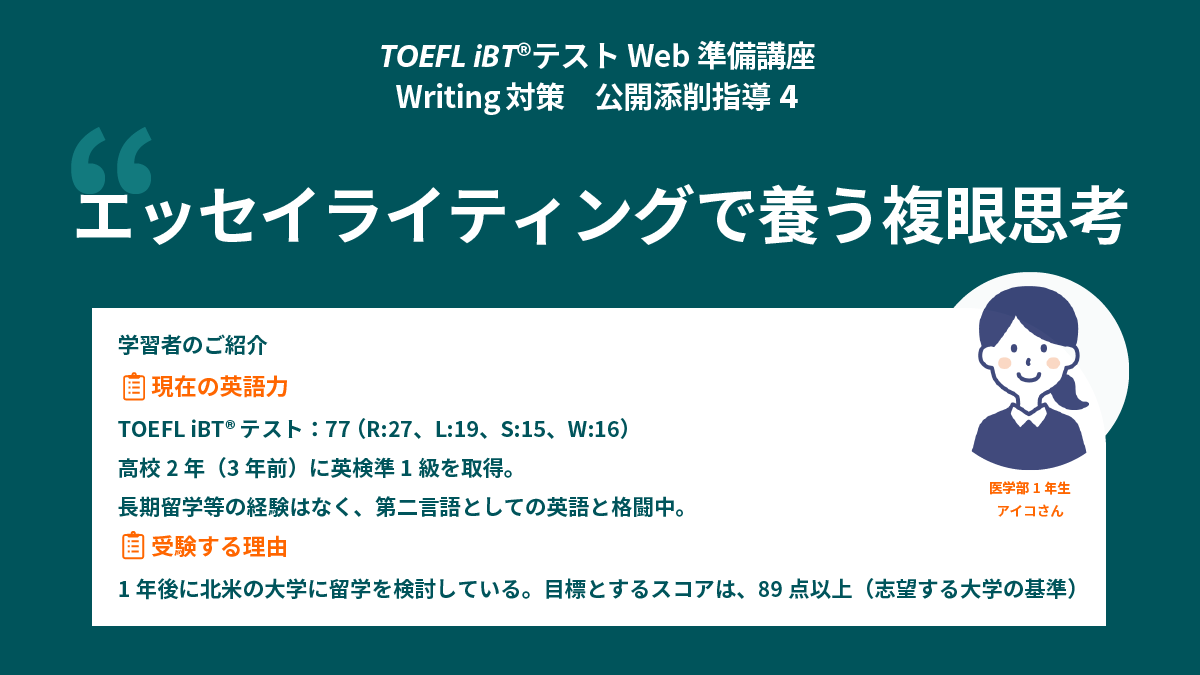
みなさん、こんにちは。TOEFL iBT®テストWeb準備講座を担当するETS公認トレーナーの横川綾子(よこがわあやこ)です。ライティング練習は進んでいますか?突然ですが、みなさんは1つの事象に関して、その利点と欠点を考える習慣はありますか?「コンビニでアイスを買うこと」を例にとってみましょう。「コンビニのアイスはほとんど値引きされていない、品数も豊富というわけではない、でもコンビニの店頭にはいち早く新商品が並ぶ、深夜でも買える、ソフトクリームを売っている店舗もある」などなど。こうした複眼思考ができれば、より納得できる決断が下せますよね。ちなみに私のお気に入りはハーゲンダッツ クリスピーサンド 抹茶ショコラで、コンビニで発作的に買うこともよくあります(笑)。

アイコさん
現在の英語力
高校2年(3年前)に英検準1級を取得。長期留学等の経験はなく、第二言語としての英語と格闘中。Reading、Listeningに比べてWriting、Speakingが苦手。初めて受けた2014年5月のTOEFL iBT®テストの結果は77点(R:27、L:19、S:15 、W:16)。
TOEFL iBT®テストを受験する理由
1年後に北米の大学に留学を検討している。目標とするスコアは、89点以上(志望する大学の基準)。
留学したい理由
将来、海外(できればアメリカ)の大学院に進学を検討しているため、1年後に留学し、語学力を向上させたい。また、北米の大学でリベラルアーツを学んでみたい、というのも動機の一つ。
英語学習全般での課題や質問
Speakingの能力に不安がある。話すときもゆっくりで時間がかかる。また、発音が悪いので、できる限り矯正して、通じやすい発音にしたい。
今回は、モデル学習者のアイコさんに、ある意見に対する賛否(agree/disagree)ではなく、1つの事象に関する利点と欠点(advantage/disadvantage)を述べるエッセイに挑戦してもらいました。このタイプのエッセイはTOEFL iBT®テストのWritingセクションのIndependent Taskでも出題されますが、難しく感じる人が多いようです。では、アイコさんの1回目のエッセイを読んでみましょう。
エッセイのテーマ
Topic 2
Many students have to live with roommates while they go to school or university. Discuss the advantages and disadvantages of sharing a room with someone as a student. Use specific details in your discussion.
多くの学生は、学校に通う間、ルームメイトと暮さなければならない。学生として、誰かと部屋を共用する利点と欠点について論じなさい。主張には、具体的な詳細を含めること。
エッセイ執筆のルール
- ブレーンストーミング(=自分の意見とその理由を考える)を十分に行う
- 使いたい単語・フレーズ・構文は事前にリサーチしておく
- スペルチェッカーは無効にしておく
- 書き始めたら辞書等は使わず、一気に書き上げる
- 構成は5パラグラフを基本とする(Introduction → Body1 Body 2 Body 3 → Conclusion)
- 最後に目視で校正し、必要な手直しをする
アイコさんのエッセイ
A lot of students need to live with roommates in dormitory when they go to school or university. There are one disadvantage and two disadvantages of sharing a room. The negative point of this is that you cannot concentrate on studying, and the positive points are that you can get close friends and that you can learn other peoples’ lifestyles.
First of all, the possible negative effect of living with roommates is that you have a lot of difficulty studying. If your roommate makes so many noises, it is hard for you to do your homework or prepare for the tests in your room. For example, if your roommates are always talking in a loud voice, or if they listen to music on high volume, you cannot concentrate. Moreover, if your roommates usually stay up late though you usually go to bed early to get up early, you cannot sleep well due to the noises they make and feel sleepy during the class. Thus, if you have some roommates if can be tough to study.
Second, one of the positive effects is that you can easily get a close friend.
Sharing a room with your roommates means you spend a lot of time with them, so naturally, you can get to know them well. You can help each other by talking together when you miss your family, teaching each other and sharing information about the university’s events. Therefore, your roommates will be really helpful and reliable partners for your university life.
Finally, the other of the positive effects is that you can learn other peoples’ lifestyle. If your roommates come from different country, they must have different lifestyles from yours. Even if they come from the same town as you, since each family has particular rules, the lifestyle of them will be different from you. So you can know their lifestyles and ideas, and you will learn to put up with their behavior. The skill is really important when you get married and live your spouse because he or she has quite different lifestyle from you. Therefore, it is good to lean to be patient with other people living with you through sharing the room with roommates.
In conclusion, sharing a room with roommates gives disadvantages in studying, but it gives you advantages in leading a university life and in acquiring generosity.
エッセイ添削例
A lot of [It is common for] students need to live with roommates in dormitory [have a roommate] when they go to school or university. There are one disadvantage and two disadvantages [advantages] of sharing a room. The negative point of this [disadvantage] is that [it may be difficult for] you cannot [to] concentrate on studying, and the positive points [while the two advantages] are that you can [having the chance to make] get [a] close friends and that you can [being able to] learn other peoples’ lifestyles [how other people live].
First of all, the possible negative effect of living with roommates is that you [may] have a lot of difficulty studying [doing homework or preparing for tests]. Iif your roommate makes [a lot of noise.] so many noises, it is hard for you to do your homework or prepare for the tests in your room. For example, if your roommates are [they] always talking [talk] in a loud voice, or if they listen to [loud] music on high volume, you cannot [won’t be able to] concentrate. Moreover [Also], if your roommates [they] usually stay up late though you usually go to bed early to get up early, you cannot [won’t be able to] sleep well due to the noises they make and feel sleepy during the class. Thus [As you can see], if you have some roommates if can be [make it] tough to study.
Second, [I will look at the advantages of having a roommate now. As I said in the introduction,] one of the positive effects [two advantages of having a roommate] is that you can easily get a close friend. Sharing a room with your roommates means you spend a lot of time with them [together], so naturally [as a matter of course], you can get to know them [each other] well. You can help [learn from] each other by talking together [about your daily lives and sharing information, such as what you did] when you miss your family [became homesick], teaching each other and sharing information about the university’s [school] events. Therefore, your roommates will be [become] [a] really helpful and reliable partners for your university [school] life.
Finally, the other [advantage] of the positive effects [having a roommate] is that you can learn [how] other [people live and also how to live with them] peoples’ lifestyle. If your roommates come[s] from [a] different country, they [he or she] must have [a] different lifestyles from yours. Even if they [your roommate] come[s] from the same [country or even] town as you, since each family has [their own] particular rules[, which] the lifestyle of them will be different from [new to] you. So you can know [learn about]their lifestyles and ideas, and you will learn to put up with their behavior [way of life, how they think, and how to live with them through the experience]. [Experiencing a roommate will help you develop] Tthe skill [of having an ‘open mind’ which] is really important when you get married and live your spouse because he or she has quite [a] different lifestyle [way of living] from you. Therefore, it is good to lean to be patient with other people living with you through sharing the room with roommates [Clearly, besides learning how other people live and how to live with them, you may learn how to have an open mind and how to be patient by having a roommate in school].
In conclusion, sharing [having] a room with roommates gives [may have] disadvantages in [when it comes to] studying, but it gives you [many other] advantages in leading a university life and in acquiring generosity [which are far more useful, not only in being able to get a close friend and learn how other people live as well as learn how to live with them, but also in how to have an open mind and perhaps how to be patient, both of which can be useful for your life in the future].
英文校正協力:Paul Strifler
横川先生からアドバイス
アイコさんのエッセイはいつも通り、構成がしっかりしていて語数も多く、意味の理解を妨げるような文法や語法のミスもほとんどありません。欲を言えば、第2パラグラフでif節が続きますが、仮定の話だけではなく、実際にあったエピソード(多少の脚色もOK)が入ると訴求力が増したはず。また、第3パラグラフではYou can… が多用されていますが、It is possible… / XX enables you to do… / XX makes you do… など構文にバリエーションを持たせてもよかったですね。そして、第5パラグラフの結論部分では、Body(本論)の要約だけでなく、より広い視野の意見を総括として追加すると、エッセイ全体が締まったと思います。次回のリライトに期待しましょう!
今回、みなさんと一緒に確認したいことは、advantage/disadvantageタイプのエッセイを書く際の「構成」です。最も大切なポイントは、利点と欠点の両方を論じること。「時間切れで欠点までたどり着けなかった~」ということのないように、ポイントを箇条書きにするなど、書き始める前のブレーンストーミング(=自分の意見とその理由を考える)の時間をしっかりとってください。
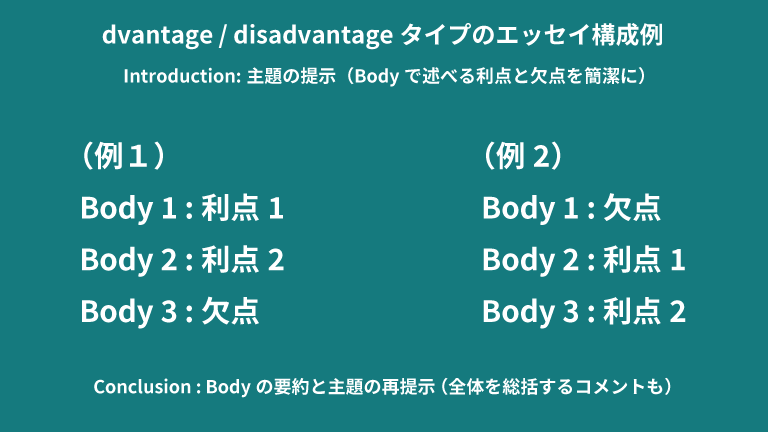
アイコさんのエッセイは(例2)のパターンでした。Body 1:欠点(=相手の出す騒音で勉強に支障をきたす可能性がある)、Body 2:利点1(=ルームメイトが親友になるかもしれない)、Body 3:利点2(=生活様式の多様性を知り、寛容さが身につく)と、利点・欠点ともに提示されています。
ブレーンストーミングの段階では、数に制限を設けず、思いつく限りのadvantage(+)とdisadvantage(-)をリストアップし、その中からエッセイで論じる項目を2~3つ選びましょう。TOEFL iBT®テストのように時間制限がある場合は、文ではなく単語で書く、記号を使うなど、時間短縮を心がけてください。はじめから英語でブレーンストーミングできる人はそうして欲しいですが、日本語で発想した方が短時間により多くの項目を思いつく場合もあります。
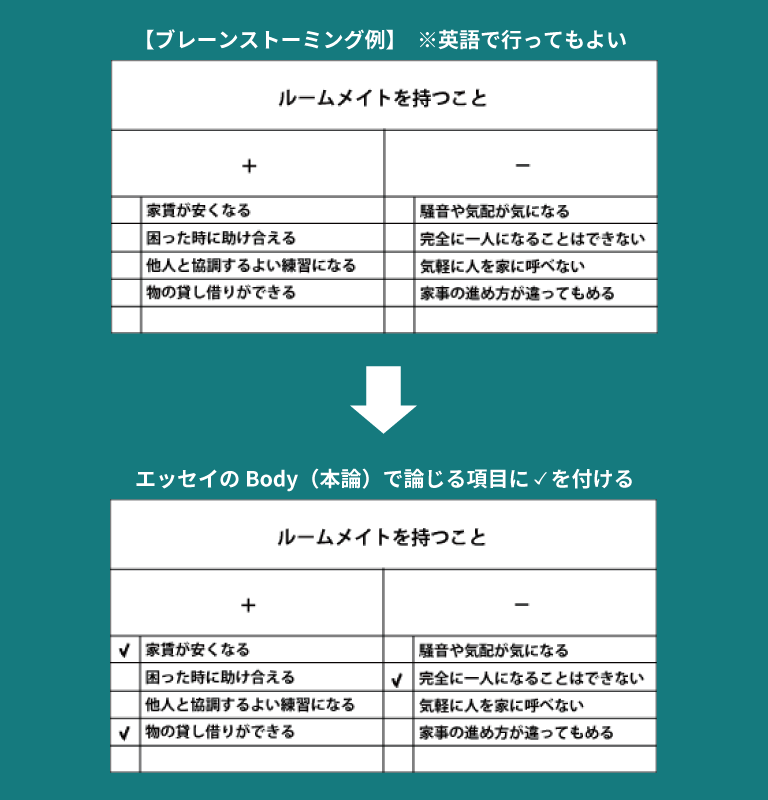
いかがでしたか? 日常生活では、改めて1つの物事に関する利点と欠点を考える機会は、そう多くないはず。エッセイライティングの練習を通じて、必要な場面では複眼思考するスキルを身につけることができれば、人生がより豊かになることでしょう。では次回にお会いしましょう。

横川綾子先生
明治大学 国際連携機構 特任教授
ETS Authorized Propell® Facilitator
ETS TOEFL ITP® Teacher Development Workshop Facilitator
上記は掲載時の情報です。予めご了承ください。最新情報は関連のWebページよりご確認ください。
学習サポート・関連情報
★テスト受験までの8週間サポート★

初めてTOEFL iBT®テストを受験される方のうち、次の対象者には週1回✖️8週間 の受験支援メール配信とTOEFL iBT® Test Prep Plannerの無料配送を行っています。
対策塾などに通わず、独学で勉強されている皆さん、「TOEFL®テストの勉強は孤独・心配・不安…」と感じていませんか?
ETS Japanは、8週間サポートを通じて、学習計画の立て方や、勉強に必要な情報の探し方をお手伝いします。目標スコア獲得に向けて受験日まで一緒に進んでいきましょう!
★公式教材を利用して目標スコアを目指そう★

目標スコア別に公式教材を利用した学習法を教材ショップのスタッフがご提案。学習の目安や各教材ごとの学習方法など、ぜひ参考にしてください。

Performance Descriptors for the TOEFL iBT® test
各セクションは0~30のスコアで評価され、そのスコアに応じて4または5段階のレベルに分けられます。このレベルはTOEFL iBT®テストにおけるCEFR levelを反映しています。
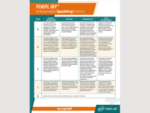
TOEFL iBT®テスト スコアガイド(Speaking)
Speakingセクションの採点基準です。上記の「Performance Descriptors for the TOEFL iBT®test」と併せてご活用ください。
SpeakingはETSが公表しているスコア基準表に沿って採点されます。採点基準はIndependent Task用・Integrated Task用にそれぞれ作成されており、Delivery(話し方)/Language Use(語彙の使い方)/Topic Development(トピックの展開)の大きく3つのポイントに分かれています。
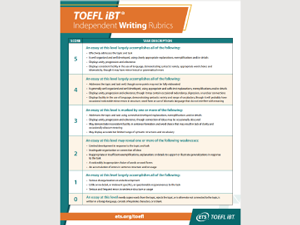
TOEFL iBT®テスト スコアガイド(Writing)
Writingセクションの採点基準です。上記の「Performance Descriptors for the TOEFL iBT® test」と併せてご活用ください。
Writingに関してもETSが公表しているスコア基準表に沿って採点されます。採点基準はIndependent Task用・Integrated Task用にそれぞれ作成されています。

英語圏の大学・機関だけでなく、世界の大学・機関で、公式スコアとして留学や就活などに活用されています。コンピュータ上で受験し、スピーキングは回答音声をマイクを通して録音、ライティングはタイピングで回答します。

自宅受験TOEFL® Essentials™テスト
2021年から自宅受験型の新しいテストとしてリリースされました。約90分の試験時間、短い即答式タスクが特徴のアダプティブ方式の導入されています。公式スコアとして留学や就活などにご利用いただけます。

TOEFL ITP®テストプログラムは、学校・企業等でご実施いただける団体向けTOEFL®テストプログラムです。団体の都合に合わせて試験日、会場の設定を行うことができます。全国500以上の団体、約22万人以上の方々にご利用いただいています。










